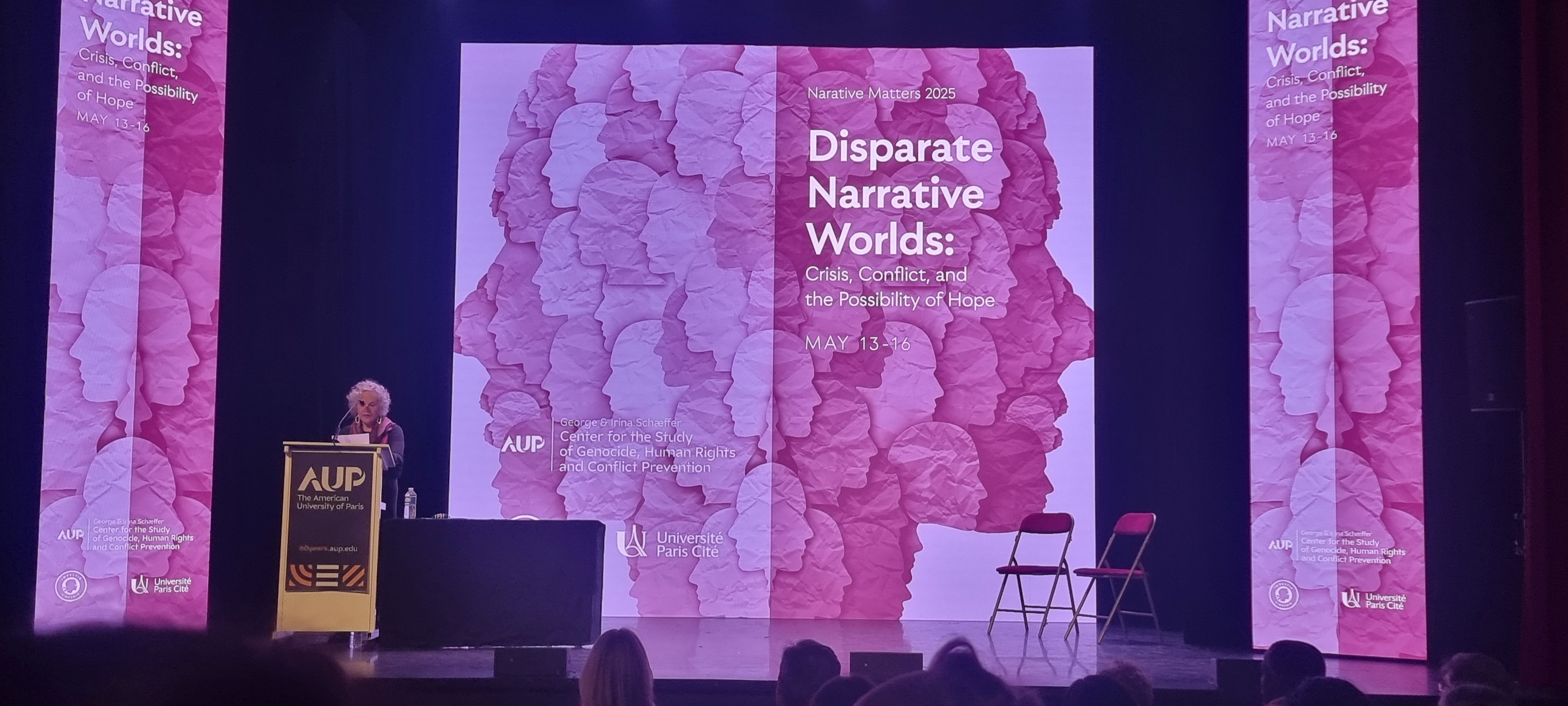Listening Across Disparate Worlds: Five Reflections from Narrative Matters 2025
Datum
17-06-2025
Auteur
Shailoh Phillips

Keynote Prof Em. Amy Shuman on story ownership
Just back from Paris, where the Narrative Matters 2025 conference unfolded under the theme Disparate Worlds: Crisis, Conflict, and Narrative. It was an unusually generative gathering—academically rigorous, politically attuned,and generous in spirit. I had the pleasure of presenting with my collegue Marike Geurts on the "Narrative and the Arts" panel, sharing insights from our research on illness narratives, arts-based methods, and curatorialpractices in palliative care. But more than what I shared, I came away with five take-aways I want to hold on to:
1. Narrative Studies Is a Wild Garden
The diversity of fields and methods was astonishing. From prison storytelling in Brazil to artificial intelligence ethics in clinical narratives, from literary analyses of postcolonial trauma to participatory theatre with migrants—this conference was a reminder that narrative studies resists easy boundaries. It is, in the best sense, an undisciplined discipline. It was moving to witness how scholars across anthropology, medicine, literature, philosophy, and education are reworking what narrative can do in a world that keeps breaking apart.
2. We Are Not Just Studying Stories; We Are in One
There was an undercurrent of urgency threading through every panel. War,displacement, climate catastrophe, political extremism—these were not just contexts but lived realities shaping the stories told, and those choosing totell them. It matters what stories we tell. And it matters who gets to tell them. More than once I heard variations on a simple claim: narrative analysisis not neutral. It’s a mode of ethical engagement with the world.

3. Listening Nearand Far
I was struck by how much I learned from Dutch colleagues whom I’d never truly listened to before, despite working in the same field. There is something about stepping outside of home ground— about being in another city, another conference room, another linguistic cadence— that shifts the air. We were all there with similar questions: How do illness narratives shape care? What does it mean to “research with” rather than “on”? How do we honour patients’ stories without instrumentalizing them? In that shared inquiry, I felt the possibility of new local alliances, forged abroad.
4. A Different Kind of Academic Climate
There was a welcome absence of posturing. Panels made space for not-knowing, for tentative phrasing, for humility. This was an academic environment where critique did not mean attack, and where complexity was not sacrificed for clarity. Many of us in narrative work live with the uncomfortable knowledge that truth is plural, that meaning is contested, that resonance is not the same as agreement. Perhaps that’s why this space felt so breathable. I realised I could make an intellectual home here.
"Many of us in narrative work live with the uncomfortable knowledge that truth is plural, that meaning is contested, that resonance is not the same as agreement."
5. The Power ofArt—and of Not-Knowing
Art kept surfacing—not as aesthetic add-on, but as method, as medicine, as amode of being with. Whether it was a zine made by cancer survivors, a sonicmapping of urban grief, or our own research on curating art in palliative care,the arts emerged as a vital way of holding the unholdable. And within that, a powerful undercurrent ran through several panels: a turn toward non-reparative narrative. Not all stories work toward healing, resolution, or coherence. Some remain fractured, looping, unresolved. Especially in contexts of chronic illness, social rupture, or deep trauma, the expectation of narrative “repair” can feel like a violence of its own.
"Not all stories work toward healing, resolution, or coherence. Some remain fractured, looping, unresolved."
The work of scholars such as Lauren Berlant and others on cruel optimism resonated here, inviting us to sit with stories that do not — and perhaps should not — move toward tidy endings. This was an important reminder: that in our desire to make meaning, we must not overwrite pain or polish away complexity.
.png)

